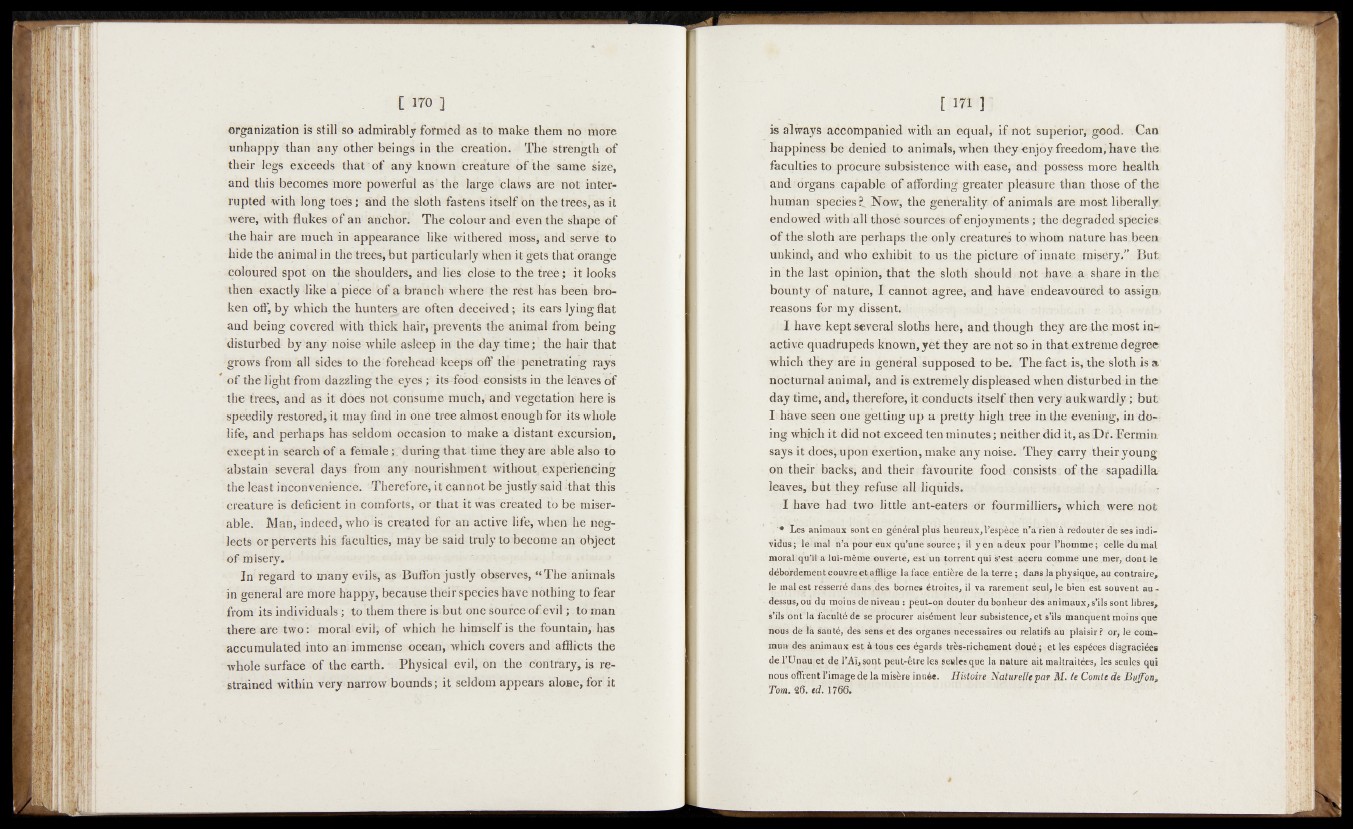
organization is still so admirablyfotmed asto make them no more
unhappy than any other beings in the creation, • The strength of
their legs exceeds that* any known creature of-the same size,
and this becomes more powerful as’ thé large-claws are not interrupted
with*long toes i and the sloth fastens itsélf On the trees, as it
were, with flukes of an anchor; The colour and even the Shape of
the hair are much in appearance like’Mthered Söiosss; aridisëfWtb
hide the animal in thetrCes, bu t particularly when it gets that orange
coloured spot on the shoulders, and lies close to the tree ; it looks
then exactly dike a piece of n branch where the rest has been broken
off, by which the hunters^ are often deceived; its ears lying flat
and being covered with thick hair, prevents the animal from being
disturbed by any noise while aslfcep in the day time; the hair that
grows from all sides to the ‘ forehead: keeps off the % perietmtmg rays
'of the light from dazzlmgthei«yes ;■ its-food consists in the leaves Of
the frees, and as it dóes not, córisüme miich,: and v'egetation here is
speedily'restored* it may find in one tree almost enough for its whole
life* and perhaps has- seldom occasion to make a distant excursion,
except in- search of a feinale j. during that time ihey are able also to
•abstain Several days from any nourishment without/expefieiSëing
the least inconvenience. Therefore, it cannot be jusjiKyisaid «that this
creature is deficient in -comforts, or that it was created to bo;miser-
able. Man, indeed, whóhs created for an active lifevwheu he neglects
or perverts his faculties, may he said truly to become an Object
of misery. *
Inf regard -to many evils, as Buffon justly observes, “ The animals
in geUeral are more happy, because their species have nothing to? fear
from its individuals; to them there isbut one source of;evil ;3Jto man
there are two: moral evih of which he himself is the fountain, has
accumulated into an immense ocean, which covers and afflicts the
whole surface of the earth. Physical evil jron the contrary, is restrained
within very narrow bounds; it seldom appears aloBe, for it
is always accompanied witlr an equal, if not superior,- good. Gan
Happiness be-denied to animals, when they enj6y freedom, have the
faculties to iprocur^subsistenGe JwithieaSe/nnd* possess more health
and 'Organs capable, of affording greater pleasure than those of the
human species ?-3§ow, the geéerality iof animals are most liberally,
endowréri .with sail those sourcésiofenjoymentsthe degraded species;
of th e sloth are perhapstheGÉlyiereatores towhomdaturebasbeen.
unkind, and who exhibk;$te us ^btvpiclureiof(innate^ /misery;” But,
in the ilast opinibn, that the sloth shôuld not Haye, a- share in the
bounty of nature, I cannot agree, and hâve eiideavoüred. to assign,
reasons for my dissent.
1 have' kept several sloths here, and though they dtotfhe firost inactive
quadrupeds known, yèt they are riot-so in thafcextreme degree
which they are in gçnéral supposed to he. The>fact is, the slothds a
nocturnal animal, and is extremely displeased when disturbed in the
day time, and, therefore, it conducts itself, then very aukwaxdly ; but
Phase.seen one gettingrup a pretty high tree in the evening, in do--
ing which itdid nobexceed ten minutes; neither, chd it, asDr’.Eermin
say s it does; upon exertion, make any noise. I They, carry their young!
on their’ backs; and their , favourite food -consists; of the 'sapadilla
leases, bùttliey refuse all liqüids. ; d J . : d Si$ - ; ® 11'$ l . iƒ, , $,> '/•,
I have had two little ant-eaters Or fourmilliers, which, were not
* Les animaux sont en général plus heureux,t’espèçe n’à rien à redouter i3‘e ses indi-
Vidus; • lerteal n’a pour eux qù’urie source ; * il y en a deux pblir Thomme; célle du mal
naoral. qu’il a lui-même oüverte, est un torrent qûj s’est ja.ceru comme une mer, dont le
déborderoéntcouy^eeb,affljge la fac^ eqti|i|e dq> Ja!terre ; dans j^physiqee, au contraire,
le mal est resserré dans,des. bornes étroites, il va rarement seul, le bien,, est souvent au .
dessus, ou du moins de niveau : peut-on douter du bonheur -dés animaux^s’ils sont libres^
s’ils ont’la faculté de se procurer aiséiisetit leür subsistence, et s’ils manquent moins que
nous dë*la &Tnté,'des sens et des organes necessaires ou relatifs au plaisir F' orÿ le commun
des animaux est à tdu^; ces égar.ds tçès-richemeqt doué ; èt les espèces disgraciées
de.rUnau et da l’Aï^sont,pei^t-êti-ejes, seule-s.que la nature ait maltraitées, les.seiles qui
nous offrent l’image de la misère innée. Histoire Naturelle p a r M . le Comte de B p ffo u ,
Torn. S3, td . 1766.